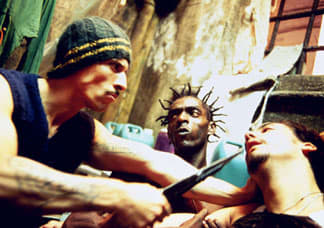Based on the book Carandiru Station by Drauzio Varella, this Brazilian film chronicles life in the largest prison in Latin America. Varella wrote the best-seller about his own experiences over 12 years serving as a physician for the infamous Sao Paulo penitentiary. The Doctor (Luiz Carlos Vasconcelos) gradually earns the respect and confidences of the inmates as he struggles to treat the numerous health problems that arise from the jail's appalling conditions with the most rudimentary equipment and educate the prison population about the burgeoning AIDS epidemic. The film shows the intricate social and power structure of the inmates and follows their daily routine of conflict and compromise, falling in love and falling apart. This narrative is inter-cut with flashbacks of the stories from the outside that led these people to incarceration. The film culminates in portraying the events of October 2, 1992 known as the Carandiru Massacre when a prison riot ended in the unmitigated slaughter of over 100 inmates by an out-of-control riot squad.
It's a compelling story, to be sure, and definitely worth telling, but there's something in the film's approach to the story that doesn't sit quite right. It seems to go beyond its attempt to humanise the prisoners by showing their personal stories and somewhat glorifying their lives of crime, making light of their violent acts and often abhorrent treatment of women, while glossing over their culpability in their own situations. There's too much emphasis on the cult of personality, as if without making the inmates loveable the audience wouldn't have minded them being massacred at the end. Still, there are many beautiful and haunting moments in the film. Hector Babenco's (Kiss of the Spider Woman) direction is deft and the performances, by some of Brazil's top acting talent, are remarkably accomplished. (Mongrel Media)
It's a compelling story, to be sure, and definitely worth telling, but there's something in the film's approach to the story that doesn't sit quite right. It seems to go beyond its attempt to humanise the prisoners by showing their personal stories and somewhat glorifying their lives of crime, making light of their violent acts and often abhorrent treatment of women, while glossing over their culpability in their own situations. There's too much emphasis on the cult of personality, as if without making the inmates loveable the audience wouldn't have minded them being massacred at the end. Still, there are many beautiful and haunting moments in the film. Hector Babenco's (Kiss of the Spider Woman) direction is deft and the performances, by some of Brazil's top acting talent, are remarkably accomplished. (Mongrel Media)
